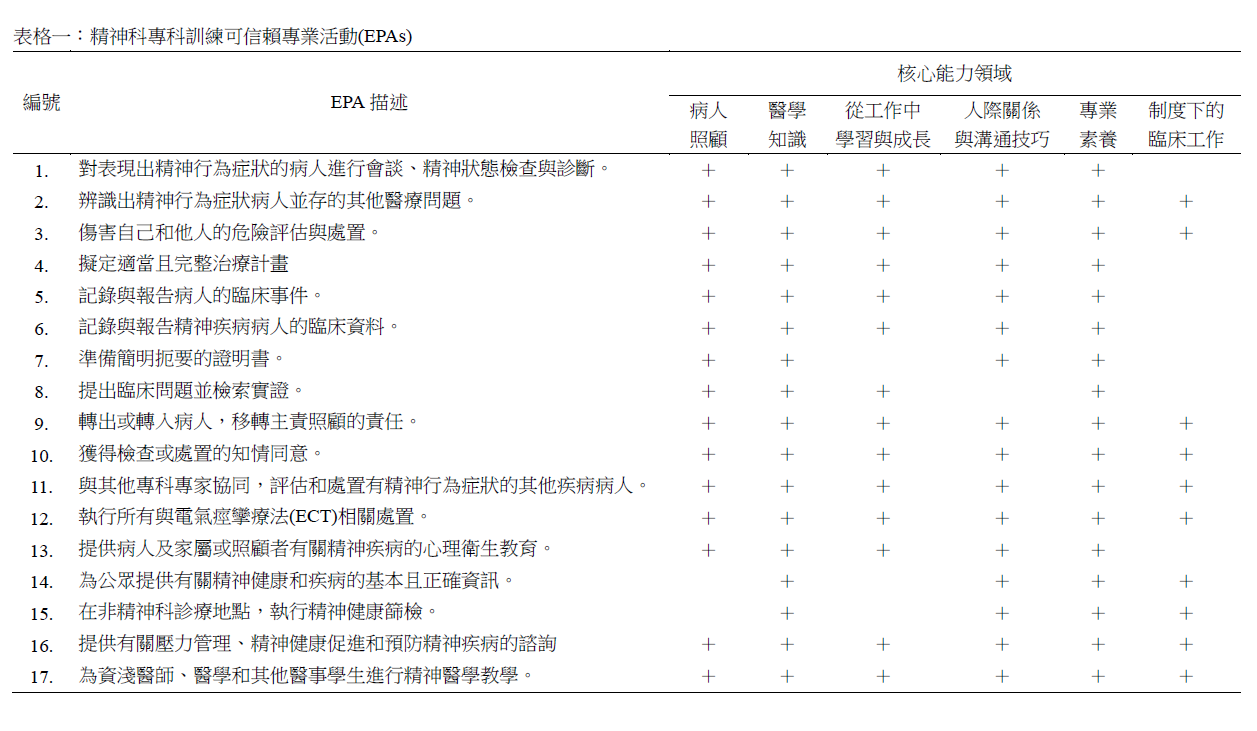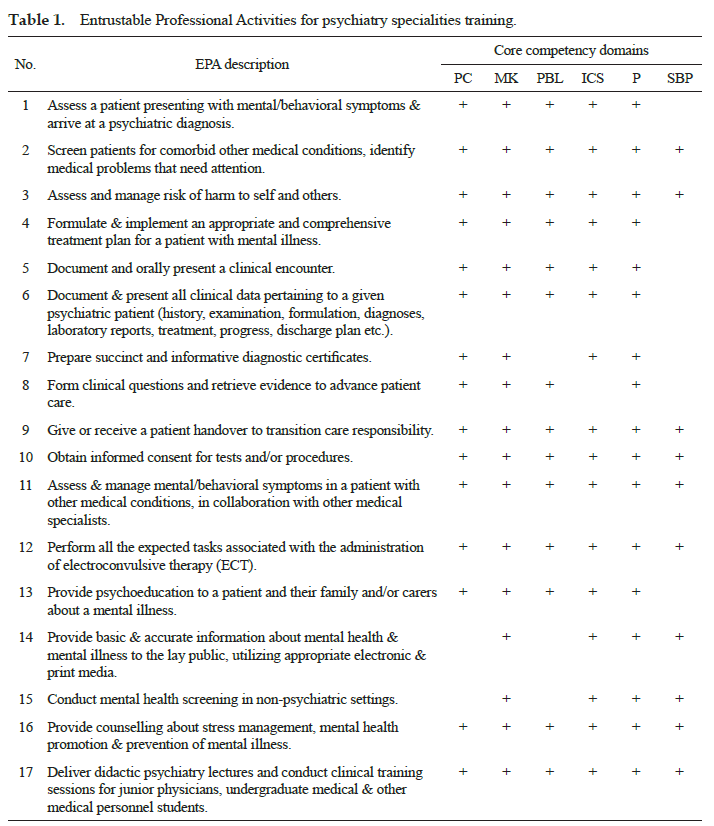精神科專科受訓學員對於「可信賴專業活動」(EPAs)的看法
精神科專科受訓學員對於「可信賴專業活動」(EPAs)的看法
由於醫師需培養特定核心能力,以滿足社會的醫療需求,因而醫學教育從傳統的師徒制,轉為以理論為基礎的教學,即「勝任能力為導向的醫學教育」(CBME)。CBME是指專科醫師訓練課程中,應培養的六大核心能力:病人照顧(PC)、醫學知識(MK)、從工作中學習與成長 (PBL)、人際關係與溝通技巧(ICS)、專業素養(P)、制度下的臨床工作(SBP)。並將之轉化成工作職場上的「勝任能力」,以培養與時俱進、符合實際醫療需求的醫師。
若要實踐CBME,「可信賴專業活動」(EPAs)是不可或缺的方法。EPAs是指藉由執行臨床任務,使學員具備足夠的核心能力,而得以被信賴並獨立進行醫療行為。因此高雄醫學大學附設醫院6位精神科醫生,透過專家焦點小組,開發一個包含17個EPAs及相應核心能力的精神科專科訓練計畫,並邀請201位學員參與本項研究,以Google Forms匿名問卷,調查其對17個EPAs的看法。總共有113位(56.2%)學員完成問卷,其中80位(70.8%)來自醫學中心;11位(9.7%)來自綜合醫院;22位(19.5%)來自精神醫院。根據調查結果,主要有下列發現:
1.不同訓練機構的學員對EPAs呈現高度的同意率,平均為92%。
2.在17個EPAs中,有12個EPAs的同意率超過90%,僅有5個EPAs的同意率低於90%,其中2個EPAs與公共衛生有關。
3.比較醫學中心、綜合醫院及精神醫院的學員對EPAs的看法,可知相較於醫學中心、精神醫院的學員,綜合醫院的學員對電抽搐療法(ECT)和移轉主責照顧責任的EPAs,同意率較低。
綜上所述,高雄醫學大學附設醫院精神科部門,以專家焦點小組,為台灣精神科專科訓練開發一個EPA計畫。藉由問卷調查結果顯示,學員對大多數的EPAs有高度的同意率。因而此項EPA計畫可謂是提供一個樣本,使各個訓練機構得依自身特點加以修改,並發展出更加適性且完善的訓練計畫。

【應用與亮點】
1.透過專家焦點小組和問卷調查法,開發台灣精神科專科第一個EPA訓練計畫
2.醫學中心、綜合醫院及精神醫院的學員,對大多數EPAs有高度的同意率
3這項EPA計畫,可作為台灣精神科訓練機構實踐CBME的範本
【研究團隊】
團隊成員:陳正生、黃美鳳、葉怡君、劉黛玲、周緯柏、王鵬為
代表單位:醫學教育暨人本化教育研究中心
團隊簡介:陳正生教授為高雄醫學大學附設醫院精神醫學部主治醫師、臨床教育訓練部主任,同時也擔任醫學教育暨人本化教育研究中心副主任。上述研究團隊成員皆為高雄醫學大學附設醫院精神醫學部主治醫師。
【論文資訊】
論文出處:Huang, M. F., Yeh, Y. C., Liu, T. L., Chou, W. P., Wang, P. W., & Chen, C. S. (2022). Perceptions on Entrustable Professional Activities (EPAs) in Psychiatry Among Specialty Trainees. Journal of Medical Education, 26(4), 33-43.
全文下載:https://www.airitilibrary.com/Publication/alDetailedMesh?docid=10282424-N202302090005-00005
Perceptions on Entrustable Professional Activities (EPAs) in Psychiatry Among Specialty Trainees
Perceptions on Entrustable Professional Activities (EPAs) in Psychiatry Among Specialty Trainees
Due to the need for physicians to cultivate specific core competencies to meet the healthcare demands of society, medical education has progressed from the traditional apprenticeship model to theory-based teaching, known as Competency-Based Medical Education (CBME). CBME refers to the six core competencies that should be developed within specialist training programs: patient care(PC), medical knowledge (MK), practice-based learning and improvement(PBL), interpersonal and communication skills (ICS), medical professionalism (P), and systems-based practice (SBP). These competencies are then transformed into "competencies" in the workplace to nurture doctors who are up-to-date and capable of addressing healthcare needs.
To implement CBME, "Entrustable Professional Activities" (EPAs) are essential. EPAs refer to clinical tasks that, when performed, enable trainees to possess sufficient core competencies to be trusted to independently carry out medical procedures. Six psychiatrists from Kaohsiung Medical University Hospital, through expert focus group, developed a psychiatry specialty training program that includes 17 EPAs and their corresponding core competencies. They invited 201 trainees to participate in the study, and used anonymous surveys collected through Google forms to investigate their views on these 17 EPAs. In total, 113 trainees (56.2%) completed the survey, with 80 (70.8%) from medical centers, 11 (9.7%) from general hospitals, and 22 (19.5%) from psychiatric hospitals. The survey results, showed:
1.Trainees from different training institutions showed a high level of agreement regarding EPAs, with an average agreement rate of 92%.
2.Among the 17 EPAs, 12 of them had agreement rates exceeding 90%, while only 5 EPAs had agreement rates below 90%, with two of these EPAs being related to public health.
3.When comparing the views of trainees from medical centers, general hospitals, and psychiatric hospitals, it was observed that trainees from general hospitals had lower agreement rates for the EPAs related to Electroconvulsive Therapy (ECT) and handover to transition care responsibility compared to trainees from medical centers and psychiatric hospitals.
In summary, the Psychiatry Department at Kaohsiung Medical University Hospital has developed an EPA program for psychiatry specialty training in Taiwan, using expert focus group methods. The survey results have shown a high level of agreement among trainees for most of the EPAs. Therefore, these EPAs can serve as a reference or guide for various institutions to adapt and develop more tailored and comprehensive training programs according to their specific needs and characteristics.

Application and Highlights:
1. The first EPA training program for psychiatry specialists in Taiwan was developed through expert focus group and surveys.
2. Trainees from medical centers, general hospitals, and psychiatric hospitals exhibited a high level of agreement with most of the EPAs.
3. This EPA program can serve as a model for psychiatric training programs in Taiwan to implement Competency-Based Medical Education (CBME).
Research Team Members:
Cheng-Sheng Chen, Mei-Feng Huang, Yi-Chun Yeh, Tai-Ling Liu, Wei-Po Chou, Peng-Wei Wang
Representative Department:
Center for Medical Education and Humanizing Health Profession Education
Introduction of Research Team:
Professer Cheng-Sheng Chen is an attending physician in the Department of Psychiatry at Kaohsiung Medical University Hospital. He also serves as the Director of Clinical Education and Training Department and holds the position of Vice Director at the Center for Medical Education and Humanizing Health Profession Education. The other team members mentioned are all attending physicians in the Department of Psychiatry at Kaohsiung Medical University Hospital.
Publication:
Huang, M. F., Yeh, Y. C., Liu, T. L., Chou, W. P., Wang, P. W., & Chen, C. S. (2022). Perceptions on Entrustable Professional Activities (EPAs) in Psychiatry Among Specialty Trainees. Journal of Medical Education, 26(4), 33-43.
Full-Text Article:
https://www.airitilibrary.com/Publication/alDetailedMesh?docid=10282424-N202302090005-00005


